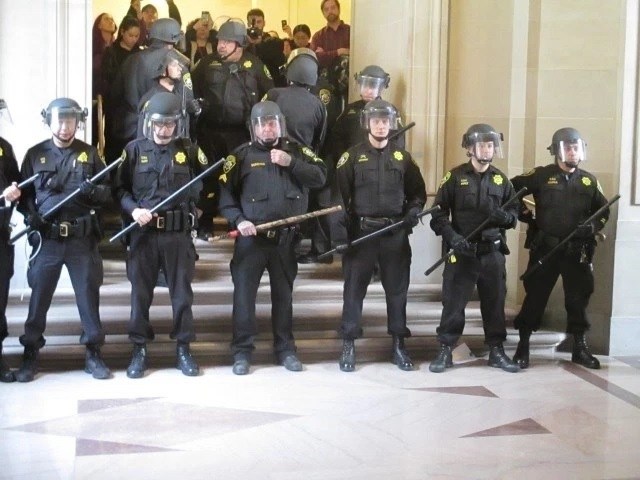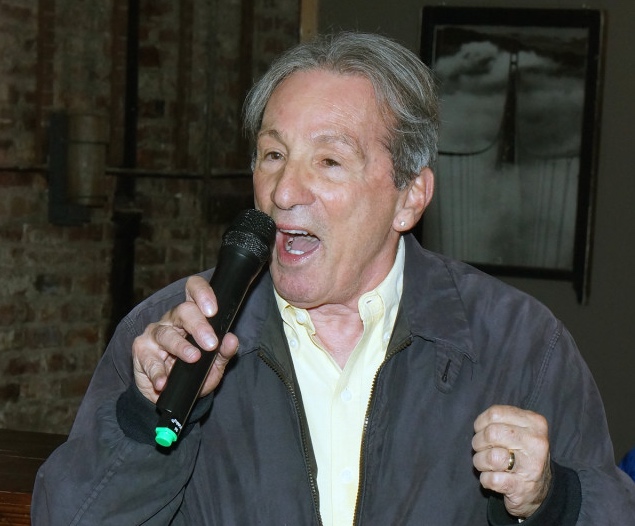It was so sad and weird to read about the death of Al Saracevic, who spend a long career in daily newspapers in San Francisco. He died Aug. 27, tragically, at just 52. We were not close, but we were colleagues in that sense that we have been in the same line of work for so many years. And just two days before he died, we had an extended email chat about our disagreements on politics in this city.
Al wrote a column that I thought was way off the mark. I responded. The he responded again, in a respectful and civil way (unlike a lot of the discourse I deal with these days).
I sent him an email and thanked him for not making this (important) political discussion personal. He responded:
Tim, thanks so much for your thoughtful responses. As I said in the article, I have huge respect for you. … Great to hear from you …Would like to keep this conversation going. Thanks man. A
The guy had class.
We are both longtime reporters and editors, and both of us started a long, long, time ago, in a newspaper world that no longer exists. I was going to wait until Monday, when he was back at work, and offer to buy him a beer.
Instead, I woke up and read his obit. What a loss.

The San Francisco Police Commission will hear Wed/7 the latest data on traffic stops, searches, and use of force by race—and the reports show that Black people are still stopped and searched far more than white people.
In the first quarter of 2022, 23 percent of the people stopped by the cops were Black. According to the latest Census data, just 5.7 percent of San Francisco residents are Black. The Census data shows that 51 percent of the city is white; 35 percent of the traffic stops involved white people. So Black people are about five times more likely to be stopped by the cops than white people.
The cops say they are making progress:
Citywide stops data since 2018 shows that Black/African American individuals have been stopped by the SFPD at higher rates per capita than other demographic categories. There has been a greater decline over time of the per capita number of Black/African American stopped in a vehicle or pedestrian stop since mid-2018.
But there’s a long way to go.
There’s a lot more data here.
The commission will also discuss, in closed session, yet another lawsuit against the city that shows the ongoing cost of police violence.
In July, 2018, according to the complaint, Susan Bell was engaged in peaceful civil disobedience during a demonstration in front of Immigration Control and Enforcement headquarters in San Francisco. From the suit: “As police officers in riot gear approached, Ms. Bell sat silently and waited … making every effort to appear as non-threatening as possible. … To Ms. Bell’s surprise, [SFPD] officers immediately commenced a violent takedown on Ms. Bell and put her in an arm bar.” She was then handcuffed for 30 minutes, in what she describes as intense pain, and taken to the hospital, where she had to have surgery for torn ligaments.
“The abuses in question,” the suit alleges, “were the product of a culture of tolerance within the San Francisco Police Department.”
The city’s response, among other things, says that Bell knew the dangers of civil disobedience when she decided to engage in it.
When the commission meets in closed session to discuss these sorts of cases, it normally means the city is ready to settle.
That is, the taxpayers will be on the hook.
The Historic Preservation Commission will hold the first public hearing Wed/7 on what is going to be a very long process of environmental review for a massive project that would transform what is now Stonestown Mall, adding almost 3,000 housing units, a hotel, 360,000 square feet of retail and “non-retail sales and service” space (that sounds like an Amazon warehouse or delivery center) and 4,200 parking spaces.
Much of the existing mall structure would remain, but it would be substantially change.
The commission gets to weigh in first, because the City Planning Department is working on a detailed Environmental Impact Report, and one element of that is historic preservation. The United Artists Stonestown Theater is a historic site.
That’s a very minor element of a very major project. Still, this will be the first time any public agency has formally looked at the environmental impacts of the project. The hearing starts at 12:30.

Heather Knight Watch: I called Tom Ammiano today after reading Knight’s latest piece, this one about how wonderful it is to be in Sacramento, where everyone in the state Legislature gets along—unlike “toxic” San Francisco. She quoted three current state legislators (Matt Haney, Phil Ting, and Scott Wiener) and two former legislators (David Chiu and Mark Leno).
Missing: Former Assemblymember Ammiano, who never got a call from Knight.
So I asked for his opinion. Sure, he told me, people in Sacramento like to go along to get along, to not rock the boat. He doesn’t think that’s so wonderful:
“If you want to make me puke, say ‘let’s agree to disagree,’” he told me. “That how all these powerful corporate interests control the Legislature. You have to challenge them.”
At committee hearings in Sacramento, he said, “all you see are fancy suits, they are all lobbyists. You don’t have to deal with real activists.”
But the friendliness is often just a veneer: “There are people who will burn down your house, kill your children, the see you on the street and compliment you on a nice tie.”
It’s way easier to be in the Legislature, he said, because “you have no scrutiny.”
Talk to any tenant activists and they will tell you it’s almost impossible to get any progressive legislation out of Sacramento: The landlord lobby controls everything. Oh, but they smile nice.
The measure that sought to tax Amazon to pay for universal basic income and support for small business is now off the ballot. The sponsors, TODCO, decided that the measure wouldn’t do what it was designed to do, and might harm local businesses, so at TODCOs request, a judge pulled it.
Here’s the statement from TODCO, which also references the Chron’s recent fail on housing policy:
Last May almost 20,000 San Francisco voters signed petitions circulated by TODCO’s state-registered campaign committee, Build Affordable Faster California, to put an “Amazon Tax” on e-commerce warehouse retail sales to fund expanded Guaranteed Income and small business assistance programs on the November City ballot. Then, three months later, we learned from the required City Controller’s revenue analysis that the measure would produce three times the revenue we expected but not necessarily tax Amazon, and instead would have unintended negative impacts on small business and the City general fund. We realized we had made mistakes in drafting its technical rules. So we suspended our campaign and went to court to have the measure, now Proposition K, removed from the ballot entirely.
Today the San Francisco Superior Court approved BAFCA’s petition and issued a Writ of Mandate to take Proposition K off the November ballot.
Yes, it hurts to have made such a public mistake and have spent almost $450,000 on a flawed measure. We apologize to all those who joined us in support of Prop K’s worthy goals. But this was also a uniquely valuable learning process, and we will use it to put a much-improved measure on the next City election’s ballot to achieve Prop K’s goals – and more! We learned:
Everyone agrees San Francisco’s small businesses need much increased help today to survive and prosper after two years of the Covid pandemic and a badly disrupted local and national economy.
Listening to small business leaders, that companies with total annual sales less than $15 million should be exempted from any increased taxes by our next measure.
And that the current full exemption from the City business tax, which now only applies to companies with less than $2 million in annual sales, should be set at a higher level.
That, given the potential for significantly more new revenue than we foresaw, $75 million per year, the allocation of the next measure’s funding should be evenly divided between small business assistance and Guaranteed Income programs, while still retaining its increased funding for homeless services programs too.
That the next measure needs a self-adjusting provision to ensure there is no negative impact indirectly on the City’s General Fund that pays for all other City programs and operations.
Compare our Prop K experience with this week’s San Francisco Chronicle front-page column that accused TODCO somehow of stopping thousands of new housing units from moving ahead in the City’s ‘Hub’ district surrounding the Market Street/Van Ness Avenue intersection by “never even starting” a community-desired equity analysis study of the impacts of a proposed re-zoning from 2019, somehow causing a delay in new zoning to permit more housing to be built there.
After we saw this published column, the Chronicle’s editors were given documented evidence that:
- In fact, TODCO had started the study as promised and it was half-completed before being stopped by Covid disruption to the community review process and staff changes in the professional consultant firm preparing it. We even sent the Chronicle the 24-page working draft!
- In fact, there was no actual delay to any new housing developments in the Hub, as evidence by a 2021 memo from the City’s Planning Department that said that explicitly in plain words.
- In fact, the immediate “State Housing Density Bonus” height limit increases of 50 percent imposed on all Hub properties by State law in 2020 were bigger than the proposed height limit increases in the delayed re-zoning anyway! The re-zoning was no longer really needed at all.
- And the AB2011 State permit approval ‘streamlining’ law passed just this week in Sacramento also eliminated any need for environmental review processes for new Hub housing projects.
Yet despite all this hard documentary proof to the contrary, this completely factually wrong train-wreck of a column is still posted on the Chronicle website now, days later.
Just like us, the Chronicle made a mistake. But the Chronicle has not admitted it. And the Chronicle has not fixed it.






